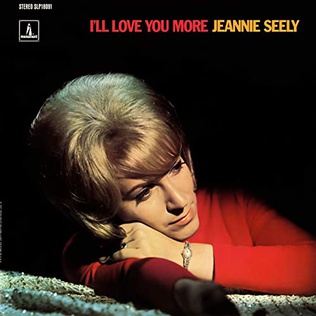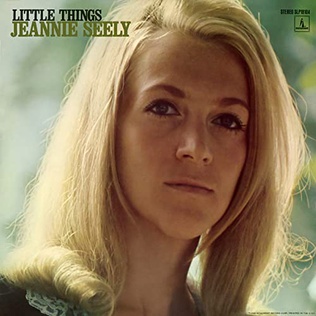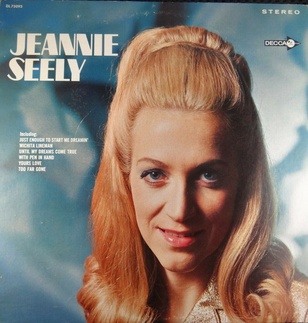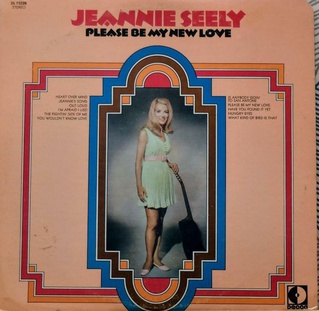
Marilyn Jeanne Seely is an American singer, songwriter, record producer, actress and author. Primarily identified with country music, Seely found success with the Grammy Award-winning song "Don't Touch Me" (1966). Her soul-inspired vocal delivery gave her the nickname of "Miss Country Soul". Seely has been a member of and performer on the Grand Ole Opry, having appeared more times on the program than any other performer.
"Funny Way of Laughin'" is a song written by Hank Cochran and performed by Burl Ives. It reached #3 on the U.S. adult contemporary chart, #9 on the U.S. country chart, #10 on the U.S. pop chart, #18 on Canada's CHUM Chart, and #29 on the UK Singles Chart in 1962. It was featured on his 1962 album It's Just My Funny Way of Laughin'.

"Don't Touch Me" is a song written by Hank Cochran. It was originally written for and recorded by American country artist Jeannie Seely. The song was released as a single on Monument Records in March 1966 and became a major Billboard country hit. "Don't Touch Me" became Seely's signature song and her biggest hit as a solo artist. It would later appear on her debut studio album and be re-recorded by Seely in later years.

The discography of American country artist Jeannie Seely contains 17 studio albums, four compilation albums, one soundtrack album, four music videos, 17 album appearances and 36 singles. Her first singles were for the Challenge label before 1966's "Don't Touch Me". The latter reached number two on the US Billboard Hot Country Singles chart and her only single to reach the Billboard Hot 100, peaking at number 85. The song was included on her debut studio album titled The Seely Style (1966), which reached number eight on the US Billboard Top Country Albums chart.

"It's Only Love" is a song written by Hank Cochran that was originally recorded by American country artist Jeannie Seely. It was released by Monument Records as a single in September 1966, rising to the US country songs top 20. It was given positive reviews from music publications following its release and was included on her debut studio album The Seely Style.

"A Wanderin' Man" is a song written by Hank Cochran that was originally recorded by American country artist Jeannie Seely. Released as a single by Monument Records, it reached the top 20 of the US country songs chart in 1967. It was Seely's third top 20 single in her career and was given positive reviews from music magazines following its release. It appeared on her second studio album called Thanks, Hank!.

"I'll Love You More (Than You'll Need)" is a song written by Hank Cochran that was originally recorded by American country singer Jeannie Seely. Released in 1968 as a single by Monument Records, it became her third top ten single on the US country chart songs chart. The song also served as the title track to Seely's 1968 studio album I'll Love You More and received a positive response from critics following its release.

"Can I Sleep in Your Arms" is a song written by Hank Cochran that was originally recorded by American country artist Jeannie Seely. Released as a single in 1973, it placed in the top ten of the US and Canadian country song charts. It also served as the title track to her 1973 studio album. The song became Seely's first top ten country single in several years and her final top ten release as well. The song was adapted from a hobo tune and a folk standard. It received reviews from several publications following its release.

The Seely Style is the debut studio album of American country artist Jeannie Seely. It was released in September 1966 by Monument Records and was produced by Fred Foster. The album consisted of 12 songs, many of which were covers of songs from the era including some written by Hank Cochran. The lead single, "Don't Touch Me" was also penned by Cochran and became Seely's first commercial success as a recording artist. The album itself reached the top ten on the US country chart. Both Billboard and Cash Box reviewed the album following its original release.

I'll Love You More is a studio album by American country artist Jeannie Seely. It was released by Monument Records in February 1968 and was the third studio album of her career. The project consisted of 11 tracks whose themes centered on heartbreak. Six of the songs were written by Hank Cochran, who helped launch Seely's recording career. Two of the songs were originally singles: "When It's Over" and the title track. The latter single reached the top ten on the US country songs chart in 1968. The album itself reached the top 40 of the US country albums chart following its release. It received reviews and ratings from Billboard, Cash Box and AllMusic.

Little Things is a studio album by American country artist Jeannie Seely. It was released on December 1968, by Monument Records and was co-produced by Fred Foster and Jim Malloy. The record was Seely's fourth studio album released in her career and included three singles issued prior to the LP: "Welcome Home to Nothing", "How Is He?" and the title track. Little Things placed inside the top 40 on the US country albums chart and received reviews from both Billboard and Cash Box magazines.

Jeannie Seely is an eponymous studio album by American country artist Jeannie Seely. It was released by Decca Records in April 1969 and was her fifth studio album. The 11-track collection featured songs written by Hank Cochran and others. Many of the songs were cover tunes, with some exceptions such as "Just Enough to Start Me Dreamin'". The latter was the album's only single and made an appearance on the US country chart in 1969. The eponymous release was Seely's first for the Decca label and received reviews from Billboard, Cash Box and Record World magazines.

"Wish I Didn't Have to Miss You" is a song written by Hank Cochran and Dave Kirby. It was originally and released as a duet by American country music artists Jack Greene and Jeannie Seely. Released as a single in October 1969, the song became a number two song on the US country chart in early 1970. The song was given positive reviews from Billboard and Cash Box magazines and would influence the making of their debut studio album in 1970.

Please Be My New Love is a studio album by American country artist Jeannie Seely. It was released by Decca Records in July 1970 and was the seventh studio album in her career. The record consisted of 11 tracks, including a medley of cover tunes called "Jeannie's Medley". The latter tune and the title track were both released as singles originally. Please Be My New Love was given positive reviews by Billboard and Cash Box magazines.

Two for the Show is a studio album by American country music artists Jack Greene and Jeannie Seely. It was released in January 1973, by Decca Records. It was pair's second studio album as a duet team. The album included two singles that reached the US and Canadian country songs top 20 between 1971 and 1973: "Much Oblige" and "What in the World Has Gone Wrong with Our Love". The latter was co-written by Hank Cochran, who contributed to four additional tracks on the album. Two for the Show also made the US country albums top 40.

"What in the World Has Gone Wrong with Our Love" is a song written by Hank Cochran and Johnny Slate. It was recorded as a duet by American country music artists Jack Greene and Jeannie Seely. It was released as a single by Decca Records in 1972, rising into the top 20 on both the US and Canadian country songs charts. It was the third and final single to make a chart appearance by the duo.

Can I Sleep in Your Arms/Lucky Ladies is a studio album by American country artist Jeannie Seely. It was released by MCA Records in November 1973 and was her ninth studio project. It consisted of 11 tracks, four of which were written by songwriter Hank Cochran. Among the tracks were six songs originally released as singles: "Tell Me Again", "Alright I'll Sign the Papers", "Pride", "Farm in Pennsyltucky", "Can I Sleep in Your Arms" and "Lucky Ladies". Its highest-charting singles were the latter two releases, reaching the US country top ten and top 20 respectively. The album itself made the top 20 of the US country chart during the same period. The project received reviews from music publications following its original release.

Greatest Hits on Monument is a compilation album by American country music artist Jeannie Seely. It was released on March 9, 1993, via Sony Music Entertainment. The album was comprised on Seely's original recordings for the Monument label during the 1960s. It included some of her biggest hit singles during her career. It also featured songs written Seely herself as well as other writers, predominantly the material of Hank Cochran.
"When It's Over" is a song written by Hank Cochran that was originally recorded by American country artist Jeannie Seely. Released as a single by Monument Records, it reached the top 40 of the US country songs chart in 1967. It was given a positive review from Cash Box magazine following its release and was included on her studio album I'll Love You More.
"Welcome Home to Nothing" is a song written by Hank Cochran that was originally recorded by American country artist Jeannie Seely. Released as a single by Monument Records, it reached the top 40 of the US country songs chart in 1968. It was given a positive review from Cash Box magazine following its release and was included on her studio album Little Things.

















